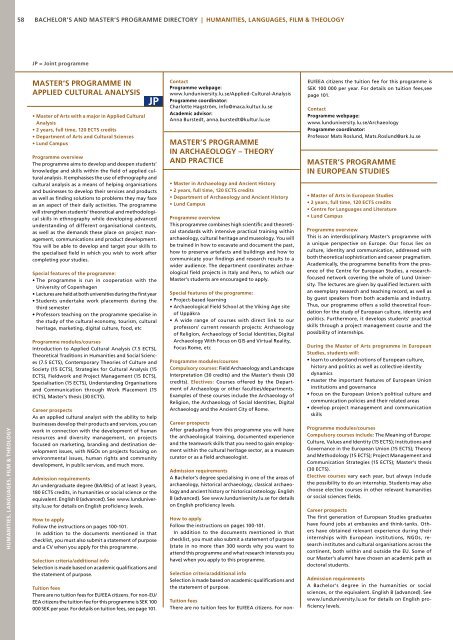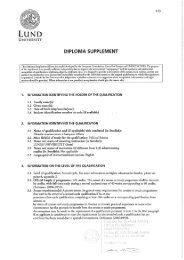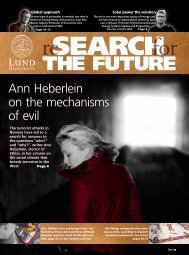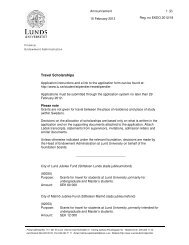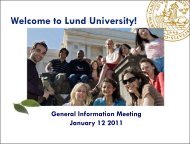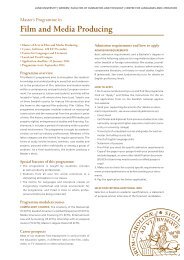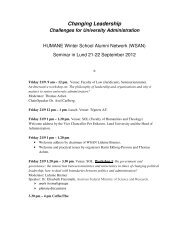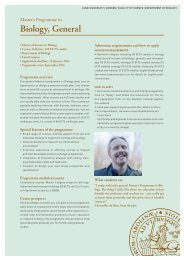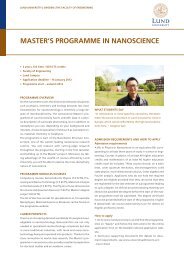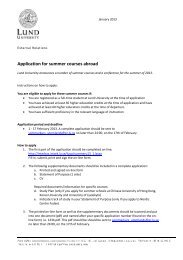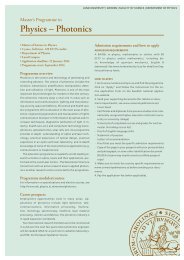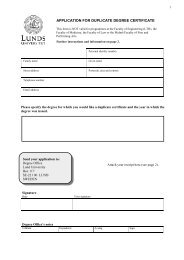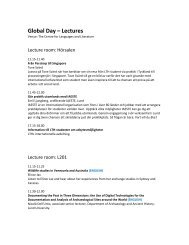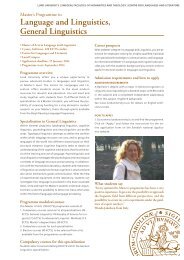Download our 2014/15 international student ... - Lund University
Download our 2014/15 international student ... - Lund University
Download our 2014/15 international student ... - Lund University
You also want an ePaper? Increase the reach of your titles
YUMPU automatically turns print PDFs into web optimized ePapers that Google loves.
58 Bachelor’s and Master’s programme directory | Humanities, Languages, Film & TheologyJP = Joint programmeHumanities, Languages, Film & TheologyMaster’s Programme inApplied Cultural Analysis• Master of Arts with a major in Applied CulturalAnalysis• 2 years, full time, 120 ECTS credits• Department of Arts and Cultural Sciences• <strong>Lund</strong> CampusProgramme overviewThe programme aims to develop and deepen <strong>student</strong>s’knowledge and skills within the field of applied culturalanalysis. It emphasises the use of ethnography andcultural analysis as a means of helping organisationsand businesses to develop their services and productsas well as finding solutions to problems they may faceas an aspect of their daily activities. The programmewill strengthen <strong>student</strong>s’ theoretical and methodologicalskills in ethnography while developing advancedunderstanding of different organisational contexts,as well as the demands these place on project management,communications and product development.You will be able to develop and target y<strong>our</strong> skills tothe specialised field in which you wish to work aftercompleting y<strong>our</strong> studies.Special features of the programme:• The programme is run in cooperation with the<strong>University</strong> of Copenhagen• Lectures are held at both universities during the first year• Students undertake work placements during thethird semester• Professors teaching on the programme specialise inthe study of the cultural economy, t<strong>our</strong>ism, culturalheritage, marketing, digital culture, food, etcProgramme modules/c<strong>our</strong>sesIntroduction to Applied Cultural Analysis (7.5 ECTS),Theoretical Traditions in Humanities and Social Sciences(7.5 ECTS), Contemporary Theories of Culture andSociety (<strong>15</strong> ECTS), Strategies for Cultural Analysis (<strong>15</strong>ECTS), Fieldwork and Project Management (<strong>15</strong> ECTS),Specialisation (<strong>15</strong> ECTS), Understanding Organisationsand Communication through Work Placement (<strong>15</strong>ECTS), Master’s thesis (30 ECTS).Career prospectsAs an applied cultural analyst with the ability to helpbusinesses develop their products and services, you canwork in connection with the development of humanres<strong>our</strong>ces and diversity management, on projectsfocused on marketing, branding and destination developmentissues, with NGOs on projects focusing onenvironmental issues, human rights and communitydevelopment, in public services, and much more.Admission requirementsAn undergraduate degree (BA/BSc) of at least 3 years,180 ECTS credits, in humanities or social science or theequivalent. English B (advanced). See www.lunduniversity.lu.sefor details on English proficiency levels.How to applyFollow the instructions on pages 100-101.In addition to the documents mentioned in thatchecklist, you must also submit a statement of purposeand a CV when you apply for this programme.Selection criteria/additional infoSelection is made based on academic qualifications andthe statement of purpose.Tuition feesThere are no tuition fees for EU/EEA citizens. For non-EU/EEA citizens the tuition fee for this programme is SEK 100000 SEK per year. For details on tuition fees, see page 101.ContactProgramme webpage:www.lunduniversity.lu.se/Applied-Cultural-AnalysisProgramme coordinator:Charlotte Hagström, info@maca.kultur.lu.seAcademic advisor:Anna Burstedt, anna.burstedt@kultur.lu.seMaster’s Programmein Archaeology – theoryand practice• Master in Archaeology and Ancient History• 2 years, full time, 120 ECTS credits• Department of Archaeology and Ancient History• <strong>Lund</strong> CampusProgramme overviewThis programme combines high scientific and theoreticalstandards with intensive practical training withinarchaeology, cultural heritage and museology. You willbe trained in how to excavate and document the past,how to preserve artefacts and buildings and how tocommunicate y<strong>our</strong> findings and research results to awider audience. The department coordinates archaeologicalfield projects in Italy and Peru, to which <strong>our</strong>Master’s <strong>student</strong>s are enc<strong>our</strong>aged to apply.Special features of the programme:• Project-based learning• Archaeological Field School at the Viking Age siteof Uppåkra• A wide range of c<strong>our</strong>ses with direct link to <strong>our</strong>professors’ current research projects: Archaeologyof Religion, Archaeology of Social Identities, DigitalArchaeology With Focus on GIS and Virtual Reality,Focus Rome, etcProgramme modules/c<strong>our</strong>sesCompulsory c<strong>our</strong>ses: Field Archaeology and LandscapeInterpretation (30 credits) and the Master’s thesis (30credits). Electives: C<strong>our</strong>ses offered by the Departmentof Archaeology or other faculties/departments.Examples of these c<strong>our</strong>ses include the Archaeology ofReligion, the Archaeology of Social Identities, DigitalArchaeology and the Ancient City of Rome.Career prospectsAfter graduating from this programme you will havethe archaeological training, documented experienceand the teamwork skills that you need to gain employmentwithin the cultural heritage sector, as a museumcurator or as a field archaeologist.Admission requirementsA Bachelor’s degree specialising in one of the areas ofarchaeology, historical archaeology, classical archaeologyand ancient history or historical osteology. EnglishB (advanced). See www.lunduniversity.lu.se for detailson English proficiency levels.How to applyFollow the instructions on pages 100-101.In addition to the documents mentioned in thatchecklist, you must also submit a statement of purpose(state in no more than 300 words why you want toattend this programme and what research interests youhave) when you apply to this programme.Selection criteria/additional infoSelection is made based on academic qualifications andthe statement of purpose.Tuition feesThere are no tuition fees for EU/EEA citizens. For non-EU/EEA citizens the tuition fee for this programme isSEK 100 000 per year. For details on tuition fees,seepage 101.ContactProgramme webpage:www.lunduniversity.lu.se/ArchaeologyProgramme coordinator:Professor Mats Roslund, Mats.Roslund@ark.lu.seMaster’s Programmein European Studies• Master of Arts in European Studies• 2 years, full time, 120 ECTS credits• Centre for Languages and Literature• <strong>Lund</strong> CampusProgramme overviewThis is an interdisciplinary Master’s programme witha unique perspective on Europe. Our focus lies onculture, identity and communication, addressed withboth theoretical sophistication and career pragmatism.Academically, the programme benefits from the presenceof the Centre for European Studies, a researchfocusednetwork covering the whole of <strong>Lund</strong> <strong>University</strong>.The lectures are given by qualified lecturers withan exemplary research and teaching record, as well asby guest speakers from both academia and industry.Thus, <strong>our</strong> programme offers a solid theoretical foundationfor the study of European culture, identity andpolitics. Furthermore, it develops <strong>student</strong>s’ practicalskills through a project management c<strong>our</strong>se and thepossibility of internships.During the Master of Arts programme in EuropeanStudies, <strong>student</strong>s will:• learn to understand notions of European culture,history and politics as well as collective identitydynamics• master the important features of European Unioninstitutions and governance• focus on the European Union’s political culture andcommunication policies and their related areas• develop project management and communicationskillsProgramme modules/c<strong>our</strong>sesCompulsory c<strong>our</strong>ses include: The Meaning of Europe:Culture, Values and Identity (<strong>15</strong> ECTS); Institutions andGovernance in the European Union (<strong>15</strong> ECTS); Theoryand Methodology (<strong>15</strong> ECTS); Project Management andCommunication Strategies (<strong>15</strong> ECTS); Master’s thesis(30 ECTS).Elective c<strong>our</strong>ses vary each year, but always includethe possibility to do an internship. Students may alsochoose elective c<strong>our</strong>ses in other relevant humanitiesor social sciences fields.Career prospectsThe first generation of European Studies graduateshave found jobs at embassies and think-tanks. Othershave obtained relevant experience during theirinternships with European institutions, NGOs, researchinstitutes and cultural organisations across thecontinent, both within and outside the EU. Some of<strong>our</strong> Master’s alumni have chosen an academic path asdoctoral <strong>student</strong>s.Admission requirementsA Bachelor’s degree in the humanities or socialsciences, or the equivalent. English B (advanced). Seewww.lunduniversity.lu.se for details on English proficiencylevels.


